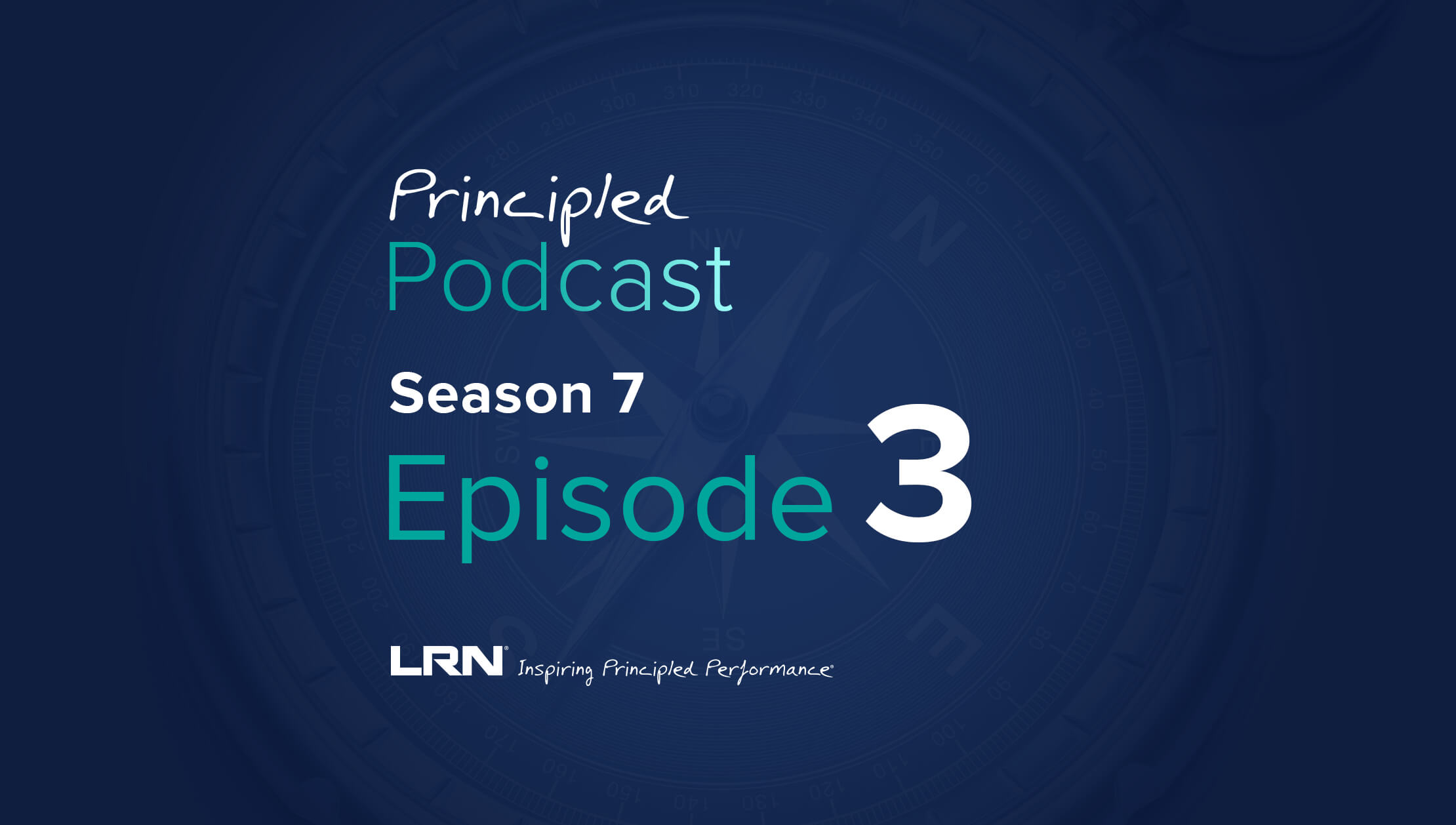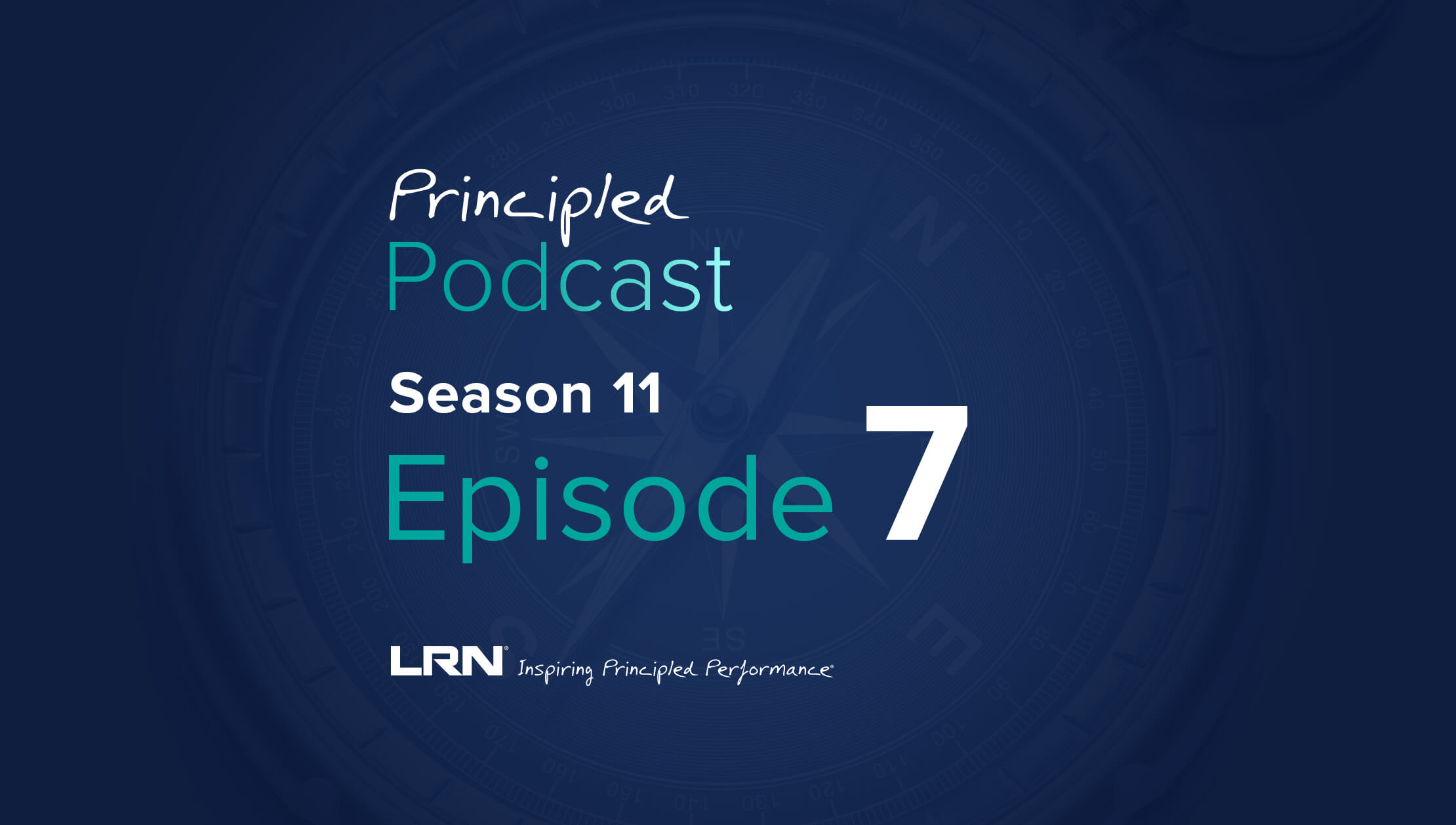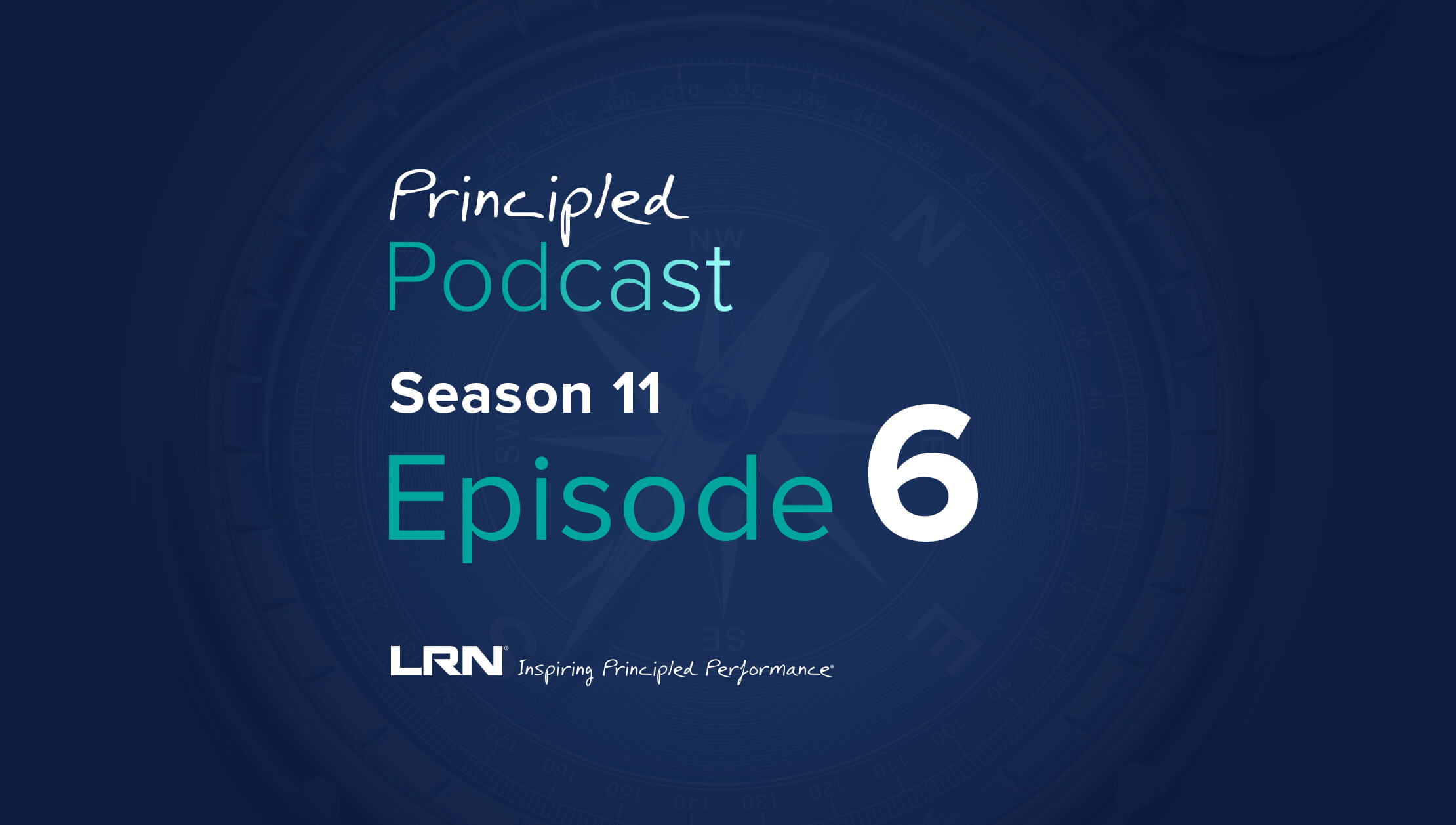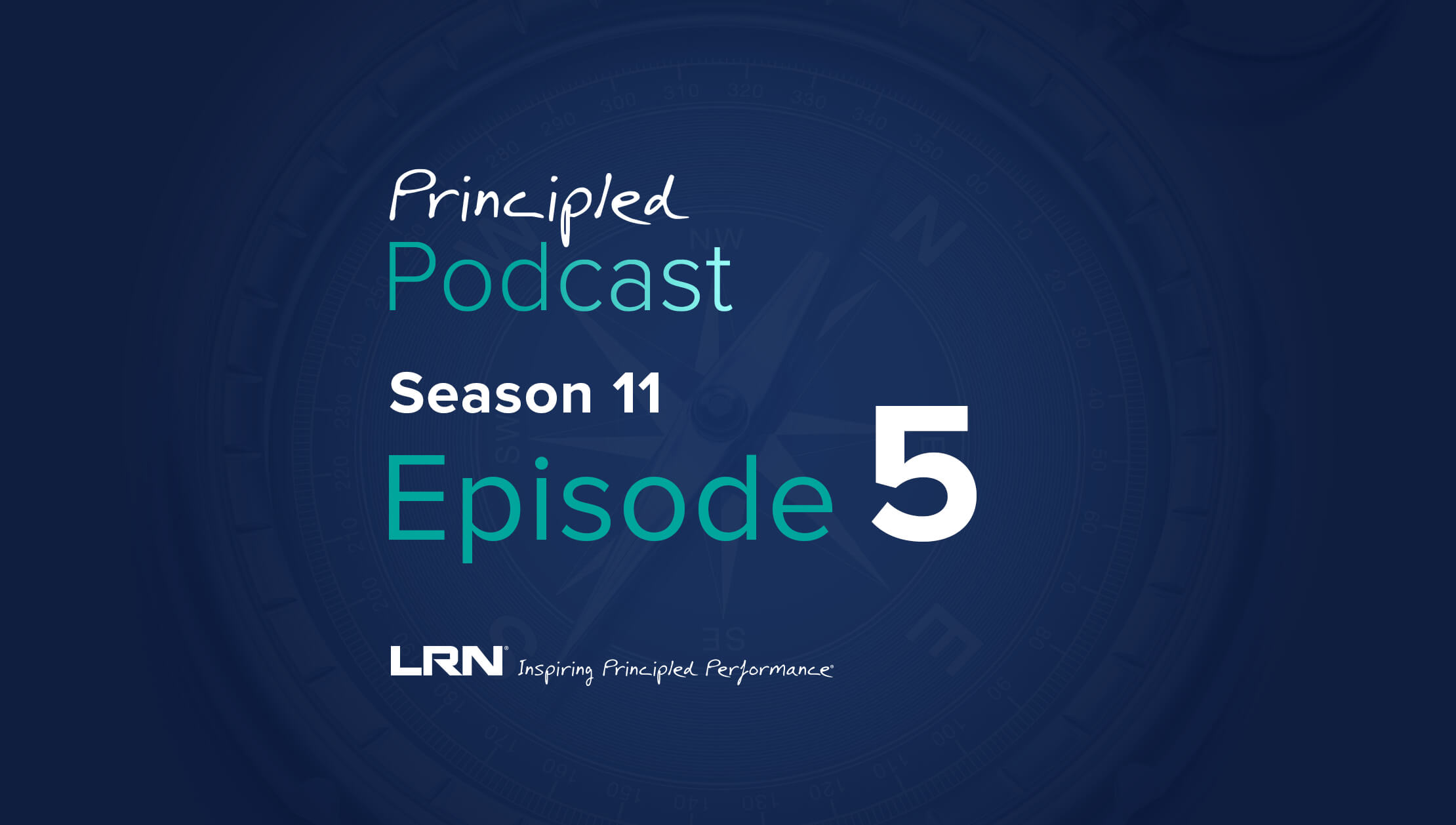What you'll learn on this podcast episode
Mobile devices influence nearly every aspect of our lives, including how we learn and process information. So, it’s no surprise that mobile is only becoming more important to ethics and compliance programs—especially when it comes to meeting employees where they are. LRN’s 2022 Ethics & Compliance Program Effectiveness Report confirms this. But how can organizations ensure that they are integrating effective mobile E&C solutions? In this episode of the Principled Podcast, host Carolyn Grace, content writer and podcast co-producer, talks with de Guise Vaillancourt, a lead project manager at LRN who specializes in mobile app development. Listen in as the two discuss how mobile solutions enhance E&C program effectiveness and what mobile considerations E&C professionals should take for the year ahead.
To learn more, download the 2022 E&C Program Effectiveness Report.
Guest: de Guise Vaillancourt

de Guise Vaillancourt is a lead project manager at LRN who specializes in mobile app development. In this role, he serves as the main contact between clients and product developers throughout the entire mobile project lifecycle—including design, content, user experience, customization, technical requirements and troubleshooting. de Guise has helped LRN launch over 20 apps for client partners in the last three years alone, thereby playing a significant role in shaping LRN’s mobile offering and its evolution.
Prior to LRN, de Guise worked on apps as vice president of international marketing for 20th Century Fox, where he contributed to development from predominantly the end-user perspective. Before that, de Guise was the executive director of global marketing at Avon Products. There, he managed and led the strategic planning, marketing, and product development for Avon's global product portfolio and built partnerships across 15 key international markets, helping transform Avon’s image into a modern beauty resource. de Guise earned his Master’s in I/O Psychology at New York University as well as a Master’s and B.A. in Macroeconomics and Finance from McGill University.
Host: Carolyn Grace
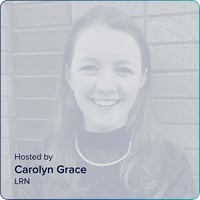
Carolyn Grace is a content writer on LRN's global marketing team and co-producer of the Principled Podcast. She specializes in writing compelling stories about ethics and compliance that resonate across business segments, industries, and personas while hitting critical KPIs for traffic and engagement. Topics she frequently covers include ESG, data privacy and protection, DEI, the role of boards of directors and leadership, corporate training and e-learning, and ethical corporate culture.
Prior to joining LRN, Carolyn was a writer and content strategist at Thinkso Creative, a boutique creative agency in New York City. At Thinkso, she wrote internal and external communications for clients in technology, nonprofit, law, logistics, and financial services sectors. Before that, Carolyn conducted trend research and cultural strategy at Horizon Media, specializing in entertainment, travel, media and technology, health and wellness, and food and beverage categories. Carolyn graduated magna cum laude from the University of Pennsylvania with a B.A. in American History and French Studies and a minor in Journalism.
Principled Podcast transcription
Intro: Welcome to the Principled Podcast, brought to you by LRN. The Principled Podcast brings together the collective wisdom on ethics, business and compliance, transformative stories of leadership and inspiring workplace culture. Listen in to discover valuable strategies from our community of business leaders and workplace change makers.
Carolyn Grace: In 1946, the first mobile phone call was made. Fast forward 75 years, and there are more mobile phone subscriptions than there are people on the planet. Mobile devices influence nearly every aspect of our lives, including how we learn and process information. So it's no surprise that mobile is only becoming more important to ethics and compliance programs. LRN's 2022 ethics and compliance program effectiveness report, which came out earlier this month, confirms this. But how can organizations ensure that they are integrating effective mobile E&C solutions? Hello, and welcome to another episode of LRN's Principled Podcast. I'm your host, Carolyn Grace, content writer and co-producer of the podcast at LRN. Today I'm joined by de Guise Vaillancourt, a lead project manager at LRN who specializes in mobile app development. We're going to be talking about how mobile solutions enhance E&C program effectiveness and what mobile considerations E&C professionals should take for the year ahead. de Guise is a real expert in this space, having helped launch over 20 apps in the last three years at LRN, thereby playing a significant role in shaping its offering and evolution. Prior to LRN, de Guise also worked on apps for 20th Century Fox and Garage Stores, most contributing from the end user perspective, which makes a good countervail for the tech perspective. de Guise, thanks so much for coming on the Principled Podcast.
de Guise Vaillancourt: Oh, thanks for having me Carolyn, glad to be here.
Carolyn Grace: I am so excited to dive into the world of mobile with you, considering how frequently you and I have collaborated on case studies and other LRN content that focuses on mobile driven E&C solutions. I'd like to start with a broader question that I'm sure many of our listeners are asking themselves. Why does it matter to have mobile as part of a corporate ethics and compliance program?
de Guise Vaillancourt: Well, I think it matters because basically, mobile apps put information directly in your hand and it travels with you wherever you may go, in a world we're increasingly globalizing. And when we're not globalizing, we're staying at home offsite. This is a really good tool to have. It greatly improves, I think access to thorny topics like ethics and compliance, bribery, data privacy and harassment aren't topics that you can easily raise with just about anyone, and sometimes could be delicate. So in that sense, the app is pretty discreet. So it's wide reaching, but discreet at the same time. So the app could reach employees who are a little hesitant about disclosing information to a live person, but then travels everywhere, everywhere an internet or a cell service is present. So I personally think that there's some handy features that E&C people should consider. I don't know, do you want me to mention a few?
Carolyn Grace: Yeah, absolutely. Tell us.
de Guise Vaillancourt: Well typically, most apps have a code of conduct section the code of conduct. So you can access the code of conduct quickly and it's broken down in sections and it's also searchable. We have much the same for policies, company policies that are segmented by topic areas and with direct links to their website with more information. We have helpline information. So if you're stuck in Santiago, Chile or something, and you need a helpline, you just get the app, go to the helpline, plug in Chile and up comes the number, press it, and presto you are connected. We have another cool feature I like is micro cards. Micro cards are pretty versatile. Micro cards sometimes are referred to as quick learning topics and can include things like the modern day infographics, which is kind of like a digital poster really. You can do text and charts.
There are responsive Q&As, so whenever you can get interaction, that's a good thing. And the feature I like the most are MP4 videos, because you want to make the app entertaining as well. Training, we usually can connect you to your LMS. Some companies have offered declaration forms or disclosures that work. A key feature are notifications, and notifications can be either direct or geo based. So if you're a direct notification, you just send a partner or an admin could send an important note to their user base and it could be something like, "Hey, check out our new policy on data privacy.", or, "Hey, we're starting our new campaign a week earlier sort of thing, press here to learn more." So that's the idea of a direct notification. There are also geo based notifications and they're kind of interesting because they only work when your phone goes from one cell tower to another cell tower that's an entirely different region or country.
So if I'm in New York and I'm taking off from JFK and then I land in Tokyo, your admin could pre-program a notification telling you once you land in Tokyo, "Hey, check out our meal limits in Tokyo that did you know they're 50,000 yen or something like that?" So there are a whole bunch of other things like who's who with avatars and GIFs, funding sources, bulletins, report a concern. There are tons of things that you could take and use and leverage sort of thing. But I will point out that despite the notifications, and I'm thinking that maybe some of your listeners will say, "Well, are you collecting PII or personal identifiable information?" And I want to assure you that we are not collecting PII in any way, shape or form.
Carolyn Grace: Yeah, an important distinction to make for sure. I think all of those features that you have mentioned really bring it back to what you said at the beginning of your response that an app can be both so far reaching and also so intimate and discreet when it needs to be, because you're totally right. I mean, these are very heavy topics and important ones to know, and to have the ability to not only put the frankly almost entirety of an ethics and compliance program into the palm of a person's hand, but to do so on such a personalized basis. I mean, we experience that in every other app that we use, right? So it's almost a no brainer. And that kind brings me to my next question, actually.
So as you know, LRN recently released the 2022 ethics and compliance program effectiveness report, which had some pretty interesting survey findings about mobile apps and mobile solutions. Most respondents shared that their organizations are making their E&C training platforms more accessible, in light of COVID and ongoing remote work conditions, but only 25% reported that they're using mobile devices to deliver training. That's just a five percentage point increase over for last year's data. What in your opinion could be some of the challenges around going mobile that are driving frankly what sounds a little bit like a slow adoption?
de Guise Vaillancourt: Mm-hmm (affirmative). Yeah, that is an excellent question, that report, the 2022 E&C program effectiveness report is a very thorough report and really well done. However, having said that, it hurts all the more, but I have to agree, 25%, that's a pretty surprisingly low number. I could offer a few hypotheses. One, I could say something that younger people tend to spend a lot more time on their phones and download many more apps than they actively use. That's the key thing. If you can have an app, but if you're not using it, who cares? So I'm wondering whether it could be a generational thing, where the numbers will evolve as the younger generation gets older over time in lieu of a sudden shift, kind of like a movement along a demand curve as opposed to a shift of a demand curve to borrow economic theory.
So that could be one reason. And then truthfully, E&C apps, Carolyn, they're rare and they're relatively new on the market. So adoption rates could be related to just sheer awareness, and even people's association with what a phone can and cannot do. People just may not associate ethics and compliance with their phone as much as they would their desktop. Human psychology could sometimes be strange in that way that they compartmentalize and they think, "Oh, okay, this type of topic, I go to an iPad to answer or I go to a desktop sort of thing, maybe not a phone." So I think it could be an awareness issue. And then if you look at socioeconomic factors, less developed countries, they're just getting a phone and cell service in which to install and use apps can be challenging, but numbers are showing that this segment or the users in less development countries are growing steadily.
It's not like an avalanche, but it is growing steadily. In more developed markets. One could argue that there are way too many apps out there already, making the app space extremely competitive. Even if there are not many apps in the E&C space, it doesn't matter. There are tons of apps. So when a user sees another app offering, they're kind of reluctant to download and go, "Oh Jesus, this is like my 200th app kind of thing." So that could be a reason as well. I think that we've looked at some adoption rates from some of the partners that we've had, and we're hovering above 10%. And I think that's a pretty good, that's a very good and strong adoption rate. So I'm not really worried about that. But I think unless something radical happens in the phone world or the app world, I think we are going to see a steady climb.
I mean, it could be at an increasing rate, but everything kind of points to a solid but steady climb. And then we can also help matters by thinking of different new ways of making our app more useful. And that's why we just release things like the iPad version of the app, which nicely caters to many salespeople that are in the field all the time or their ordering system is through an iPad. So it's just an easy dance over to the Catalyst Mobile app. So I think eventually, maybe the game changer will be the app to LRN's other products, like maybe Console. I don't expect like a, as I said before, a shift in demand. I do expect a continuing growth, but a strong, healthy growth in demand.
Carolyn Grace: Absolutely. And I think that's a really good level setting of the data and contextualizing of the data because you do make a great point that the idea of an ethics and compliance app is in of itself a very new concept in addition to just access to mobile devices in general. It's newer than say, Western audiences or even just our own company, tend to think about it. And so I think you mentioned the adoption rate within LRN's own product as an encouraging sign. I think another encouraging sign from the program effectiveness report is that the majority of respondents, 56% in fact did say that integrating major ethics and compliance program elements into a mobile app is a high priority for their program in the near future. What I'd like to know is what recommendations would you give to those folks who are just starting out?
de Guise Vaillancourt: I think that the first thing is who you have on your team. I would try to make it as cross-functional, cross-generational, as representative of your company as possible. That being said, you can't have 50 people on a team to develop an app, no, but you could at least have some sort of consulting mechanism where you test out certain features or certain concepts. So that would be the first thing that I would say is even before you get going, make sure you're evaluating it from multiple perspectives, not just the human resource perspective or the ethics and compliance perspective. Do it from the 22 year old temp that's been there for two years sort of thing. Maybe they have something to say that you never thought of. So that's one thing I would do. The other thing is I always like, whether it's an app or other things, especially when it comes to usage, I always like to keep things simple. Make your app easy to use if you can.
I realize that there is sometimes a lot of pressure to put everything in the kitchen sink in the app, but I think you need to start being choosy. You need to think, "Okay, well what kind of content makes sense to go in an app?" Does it need to become a repository of the bank of policies that you guys, that a partner keeps, or is it stuff that people are going to look at within 20 seconds? What do they need to know in 20 seconds? So that's the other thing I would keep in mind is understand how people use their phones and how they use an app. And you don't have the time that a desktop would afford you. So that's the other thing I would say. We have some apps. They have become these repositories for endless and detailed policies, often in 25 languages.
This makes the app a challenge to navigate for the end user. But from our business perspective, it's also a nightmare for the admin person to manage such a thing. If you have like 100 different policies, 25 different languages and something changes in the policy, you're going to have to upload a lot of documents just to keep your app current. That's a turnoff, especially if you're spending way too much time on these things. So if the admin is turned off, well, he or she's going to be less of a champion for the app within the company. And you need that admin to be your champ in the company. So for multiple reasons, I would say just please try to keep it simple. Accept the idea that you are going to have to make choices and saying yes is easy. Saying no is hard because you have to kind of evaluate, okay, why can I let this person into the party kind of thing, or this policy into the app?
So base it on the fact that people will look at an app in a much shorter time period than a desktop. That could be a helpful guide into what kind of content you include or exclude from your app. I would get, in the idea of making entertaining, sure put some stuff in there like Q&As. Make contests out of it, make your own leaderboards sort of thing. That always helps. Get senior management to guest star in the app. Interview them. Film a video. We did have one CEO who welcomed his company to their annual campaign kickoff, but I haven't seen that enough. And of course, the higher up you go in the hierarchy, the more eyeballs or users it's likely to attract. So I would definitely get senior managers, not just the CEO. There are lots of other people that could get involved. It could be the country head of the Philippines. It could be the head of IT. It could be the head of anything, marketing even, God forbid, Carolyn, no just kidding, but yeah, so I would do that. I would use the notification feature a lot. That's a pretty unique feature that we do have is interact with your user base by using notifications, whether they be direct or geographic based notifications. So those would be a few things I would think of.
Carolyn Grace: Yeah, absolutely. And I think you make such a great point here that simplicity is so key, especially when you are thinking about the folks who are actually using the app, but you make a great point that getting to simplicity can be quite complicated, but there is clearly such a value in bringing multiple perspectives together in order to figure out what makes sense to our specific company, how are we going to get our specific employee base engaged and really trying to whittle that down to the need to know elements. I completely agree. Speaking of perspectives, actually, I know that you have worked on mobile app developments with both U.S. based and Europe based companies. What stands out most to you about the differences or similarities in these types of projects?
de Guise Vaillancourt: Well, this last year, we developed apps actually for two European partners and they're now deployed and we have a new one that will be onboarding very soon, i.e. kicking off pretty soon. I guess the big thing, there are obviously cultural differences, but from a regulation point of view, straightforward, the GDPR data privacy rules and directives are definitely a big concern for our European partners, particularly because of the fact that our servers are based here in the United States. But we overcame this with these two partners. We adapted a few features to suit their rules and with legal and corporate IT's help, we were able to sign a data privacy agreement that assured the partners and made them a lot more comfortable that we were GDPR compliant. So that's one thing. I think with our European partners or our non-U.S. based partners, the translations tend to be very important because you basically get, everybody wants English, that's for sure, but they also want the home country or where they're operating in.
And they're not just content translations, they're user interface or UI translations as well. So that's a much bigger deal at least with our two European partners that we worked with over this past year. So our translation team in Mumbai, thank you very much. They've helped us streamline the process incredibly. So it's made our job on the app team a lot easier. I think the Europeans, just based on the size of their countries, Europeans tend to travel a little bit more internationally, whether within the EU or beyond the EU. So travel related content like meal limits in specific countries, those things tend to be a little bit more important, but in the end, I think the app, it's a good tool and it really depends on the content you feed it. We can adapt it to a certain point, but at the end of the day, the important thing is that you have to, or the partner has to really think of ways of attracting users and usage that they need to view the app, not just as a tool, but an active tool.
Carolyn Grace: That makes a ton of sense. I really resonate with the idea that the app is only as good as the content you feed it in the simplest of terms. But that piece is so important. With that in mind, I can only imagine that developing mobile solutions is a highly iterative process, especially for ethics and compliance programs, given everything that we've talked about so far. What are some key insights that you have learned from doing this type of work and how can those insights inform the way E&C professionals should approach mobile in 2022?
de Guise Vaillancourt: Okay. Now you're going to think I'm contradicting myself, Carolyn. If you have a core team that's representing the partner, that's as small as could possibly be, that's a good thing. But then what that core team should do is that they should go back to a consulting group or a group that's representative of the whole company like I mentioned before and bounce ideas off of. Maybe it's wishful thinking, but it's nice when you can consolidate the decisions, the main decisions, not approval, but decisions in the hands of a fewer core team. Does that make sense or does that sound like I'm completely contradicting myself?
Carolyn Grace: No, I think it makes sense if only because it highlights this duality that clearly, ethics and compliance professionals are experiencing when it comes to mobile solutions. There's the fact that this space is by nature, highly complex. And then there is the reality of the experience with a mobile app, where as you said earlier, simplicity is key. So trying to figure out how those two realities can work in tandem is I can only imagine an ongoing problem to solve by ethics and compliance professionals and team members like yourself.
de Guise Vaillancourt: Okay. So I'd also recommend upfront that colleagues in information security, IT departments and communications department, especially if they're involved in branding, get involved before we even have a kickoff meeting. So there's certain parameters that are already set. There are no surprises as we develop the app.
Carolyn Grace: Yeah. That makes a ton of sense and goes back to, I think what you said at the beginning, that there is definitely a lot of power in multiple perspectives. And at the same time, as you mentioned in your first response, the importance of keeping it simple and pared down can still work to your advantage, but that doesn't mean you have to stay within that bubble. I completely, completely agree. de Guise, this has been such an insightful conversation. We could be talking about mobile and its impact on ethics and compliance for hours. And we have, outside of the recording studio and our other projects but it is time for us to wrap up, or I guess I should say hang up this episode. So thank you so much again for joining me today.
de Guise Vaillancourt: Well, thanks for having me, Carolyn, it's been fun and it's always, I always get a kick out of promoting the app because I truly believe it's a great product.
Carolyn Grace: Absolutely. And thank you all to our audience for listening. You can learn more about the importance of mobile solutions and LRN's mobile solutions by downloading a copy of the 2022 ethics and compliance program effectiveness report at lrn.com or by clicking the link in our show notes. I'm Carolyn Grace, and we'll see you next week on the Principled Podcast.
Outro: We hope you enjoyed this episode. The Principled Podcast is brought to you by LRN. At LRN, our mission is to inspire principled perform in global organizations by helping them foster winning ethical cultures rooted in sustainable values. Please visit us at lrn.com to learn more. And if you enjoyed this episode, subscribe to our podcast on Apple Podcasts, Stitcher, Google Podcasts, or wherever you listen. And don't forget to leave us a review.
Be sure to subscribe to the Principled Podcast wherever you get your podcasts.
